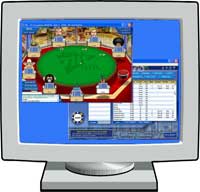 On November 14th, experts in their fields testified to the House Judiciary Committee calling for a reversal in the U.S. policy related to internet gambling. Their argument was that prohibition of online gambling as with the current UIGEA, violates the principles of personal freedom and individual liberty of American citizens.
On November 14th, experts in their fields testified to the House Judiciary Committee calling for a reversal in the U.S. policy related to internet gambling. Their argument was that prohibition of online gambling as with the current UIGEA, violates the principles of personal freedom and individual liberty of American citizens.
They also explained that the U.S. online gambling policy violates U.S. treaty obligations and how that will affect the U.S. businesses overseas as well as testimony about verification software that could protect against underage gambling as well as compulsive gambling.
The testimony at the hearing was provided by Annie Duke, professional poker player, Representative Shelley Berkley a Democrat from Nevada, Professor Joseph Weiler from the New York University Law School and the representative from Aristotle, Inc, a top online verification service provider, Michael Colopy.
As of this article, you can see the whole session at the House Committee on the Judiciary web page. Here are some of the highlights from each speaker that came from the Safe and Secure Internet Gambling Initiative press release.
Representative Shelley Berkeley testified for the need of the change in policy to protect the millions of U.S. players who continue to play online.
“A combination of outdated laws, selective enforcement by the Justice Department, and an intentional lack of clarity by Congress resulted in a confusing environment for those law-abiding Americans who want to wager online, and that was before enactment of last year’s so-called Unlawful Internet Gambling Enforcement Act,” said Berkeley. “The UIGEA actually made things even more confusing by targeting the financial sector rather than gamblers, and further memorializing the carve-out for horseracing. Although some Internet gaming executives have been arrested and some of the more reputable operators have stopped doing business in the U.S., an estimated 10 million Americans are still wagering online on poker alone, and they are doing so without the benefit of the protections afforded by effective regulatory oversight…I applaud this committee for attempting to lay the groundwork for a legislative solution that ideally would legalize online gaming, subject it to some sort of regulation, and protect underage and problem gamblers.”
It was Annie Duke that testified about the right Americans should have to decide whether to gamble online or not without the government intervening. Not only is Annie Duke an excellent poker player but she also proved she is a solid public speaker.
“What’s at stake here is the right of individual Americans to do what they want in the privacy of their homes without the intrusion of the government,” said Duke. “This country was among the first to embrace the idea that there should be distinct limits on the ability of the government to control or direct the private affairs of its citizens. More than any other value, America is supposed to be about freedom. Except where one’s actions directly harm another person’s life, liberty or property, our government is supposed to leave citizenry alone. Examples of Congress straying from this principle are legion, but few are as egregious as The Unlawful Internet Gambling Enforcement Act of 2006.”
It was Law Professor Joseph Weiler, an expert in the law of the WTO that provided testimony about how the U.S. is in violation of WTO trade agreements in regard to online gambling and why it should try to bring itself into compliance.
“The U.S. bans online gambling offered by overseas operators even though it made treaty commitments to allow it and even though it allows online wagering domestically, including for horse racing,” said Weiler. “We should bring our law and conduct into compliance with our international legal obligations. Our country is the trendsetter and leader in so many international arenas. Whether we like it or not, we lead by example. As our economy moves increasingly towards a high tech, knowledge based service oriented model and as we realize that our future prosperity will depend increasingly of tapping into export markets, notably the huge emerging markets such as China and India, is it really in our self interest to teach this particular example? How we would we feel if China prosecuted and imprisoned American businessman for engaging in commerce in China that the government there decided to ban despite its treaty obligations?”
As for one of the reasons that seem to come up the most for banning online gambling, Michael Colopy testified on the using of technology and controls already available to combat compulsive and underage gambling over the internet.
“Online age and ID verification has matured as a needed solution such that any merchant may do online what is routinely done at stores every day across America,” said Colopy. “In fact, as ever more efficient technologies and databases have been developed, online transactions have become in many instances faster and less risky than the visual driver’s license scans that suffice for alcohol or cigarette purchases in America’s neighborhood convenience stores, restaurants and bars.”
Jeffery Sandman from the Safe and Secure Internet Initiative summed it all up by saying, “Instead of prohibiting Internet gambling, which is futile and denies Americans the freedom to decide whether to gamble online, the government should regulate and tax Internet gambling. Regulated Internet gambling would ensure proven and effective security controls are available to protect consumers and capture billions in revenue that is needed for critical government programs.”
100% up to $3,000 Bonus
Bovada is our most recommended ONLINE CASINO and POKER ROOM for US players with excellent deposit options. Get your 100% signup bonus today.



Leave a Reply
You must be logged in to post a comment.